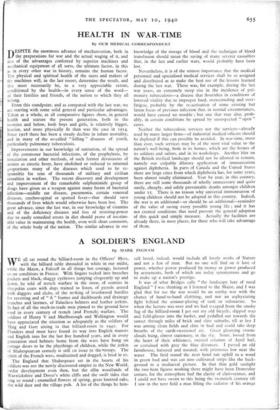HEALTH IN WAR-TIME
By OUR MEDICAL CORRESPONDENT
ESPITE the enormous advance of mechanisation, both in the preparations for war and the actual waging of it, and also of the advantages conferred by superior machines and mechanical equipment of all sorts, the ultimate factor, in this as in every other war in history, remains the human factor. The physical and spiritual health of the users and makers of the machines will, in the last resort, determine the result, and this must necessarily be, to a very appreciable extent, conditioned by the health—in every sense of the word— of their families and friends, of the nation to which they all belong.
From this standpoint, and as compared with the last war, we are starting with some solid general and particular advantages. Taken as a whole, as all comparative figures show, in general health and stature the present generation, both in the twenties and below, both boys and girls, is relatively bigger, heavier, and more physically fit than was the case in 1914. Since 1918 there has been a steady decline in infant mortality, and in many of the so-called " killing " diseases of youth, particularly pulmonary tuberculosis.
Improvements in our knowledge of sanitation, of the spread of the commoner bacterial infections, of the prophylaxis, by inoculation and other methods, of such former devastators of armies as enteric fever, have abolished or reduced to minimal proportions many of the diseases which used to be re- sponsible for tens of thousands of military and civilian casualties in warfare. The recent discovery and development and improvement of the remarkable sulphanimide group of drugs have given us a weapon against many forms of bacterial infection—middle ear disease, pneumonia, certain venereal diseases, cerebro-spinal or spotted fever—that should save thousands of lives which would otherwise have been lost. The great advance, since the last war, in our knowledge of vitamins and of the deficiency diseases and loss of resisting-power due to easily remedied errors in diet should prove of inestim- able value in maintaining the health, even with short commons, of the whole body of the nation. The similar advance in our knowledge of the storage of blood and the technique of blood transfusion should mean the saving of many severer casualties that, in the last and earlier wars, would probably have been lost.
Nevertheless, it is of the utmost importance that the medical personnel and specialised medical services shall be so assigned and distributed as to make the best use of the lessons learned during the last war. There was, for example, during the last war years, an extremely steep rise in the incidence of pul- monary tuberculosis—a disease that flourishes in conditions of lower ed vitality due to improper food, overcrowding and over- fatigue, probably by the re-activation of some existing but latent focus of previous infection that, in normal circumstances, would have caused no trouble ; but one that may also, prob- ably, in certain conditions be spread by unsuspected " open " cases.
Neither the tuberculosis services nor the services—already used by many larger firms—of industrial medical officers should be depleted if this can possibly be avoided. In war-time, more than ever, such services may be of the most vital value to the nation's well-being, both in its homes, which are the homes of its soldiers and sailors, and in its workshops. Another blot on the British medical landscape should not be allowed to remain, namely our culpably dilatory application of immunisation against diphtheria. In parts of Canada and the United States there are large cities from which diphtheria has, for some years, been almost totally eliminated. Year by year, in this country, there are still some thousands of wholly unnecessary and quite easily, cheaply, and safely preventable deaths amongst children under 15. There is no reason why universal immunisation of young children should not be adopted in this country. Indeed, the war is an additional—or should be an additional—reminder of the value of saving every possible young life ; and it has not created conditions that need prevent the general adoption of this quick and simple measure. Actually the facilities are already there, in most places, for those who will take advantage of them.






























 Previous page
Previous page